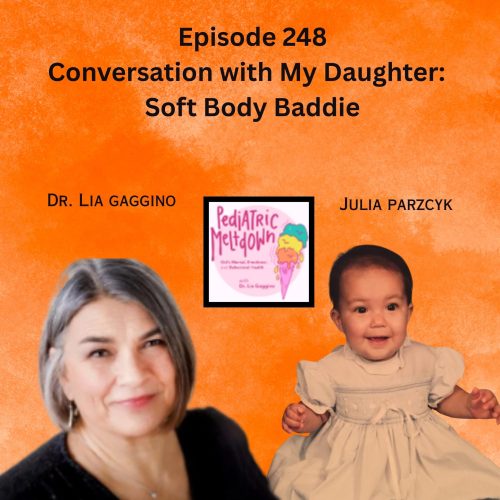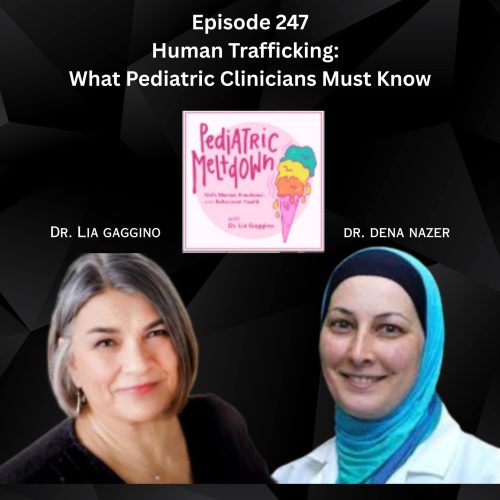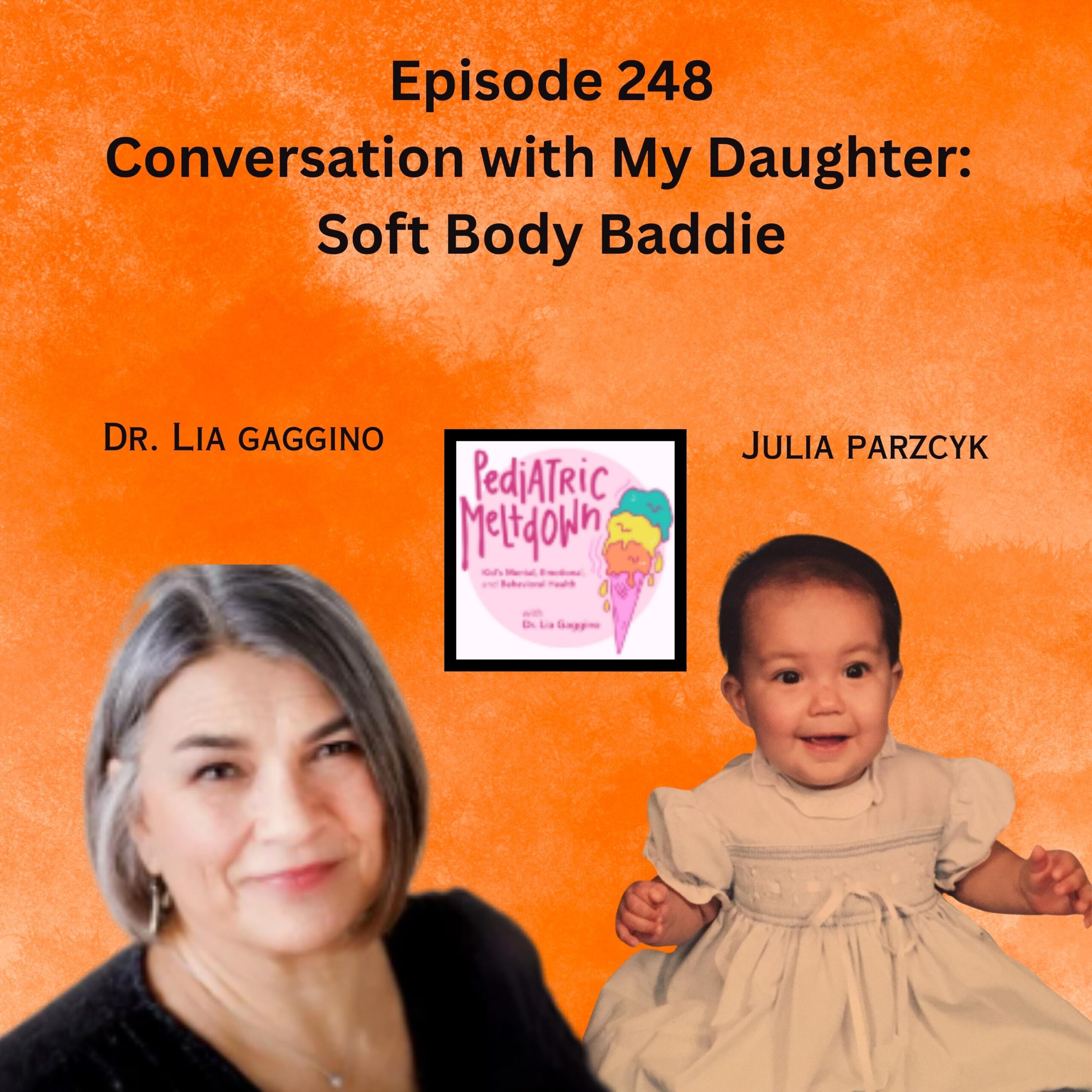School Avoidance, social anxiety, and phobias are all common in childhood affecting 5% to 12% of kids. This is a lot of patients showing up in pediatric practices. The gold standard for treatment is exposure therapy, but that model has its limitations. How do you get a kid on an airplane multiple times to help with fear of flying? A new virtual reality (VR) therapy model is an exciting option. Trained psychologists use VR goggles and with sophisticated software create a patient avatar and experiences where patients can gradually face their fears. Research shows in small studies that the experience feels real and that fears diminish. Larger RCT are needed to push this therapy into the mainstream. Dr. Abbie Vanderwege shares her successes with this therapy and walks us through the patient experience. This is an exciting option for children and adolescents who are struggling.
Dr. Vanderwege with a major in Psychology from Kalamazoo College in 2004, quickly transitioned into the master’s degree program in Counseling Psychology at Western Michigan University, which she completed in 2006. While working toward that degree, she developed an interest in holistic health and pursued a graduate certificate in Holistic Health Care, which she also received in 2006. Dr. Vanderwege then accepted a position as a family therapist for the Family Reunification Program at Bethany Christian Services. Feeling at home in Kalamazoo, she entered the APA-accredited Ph.D. program at Western Michigan University in Counseling Psychology in 2007 and completed a full-time APA-accredited predoctoral internship at the Battle Creek VA Medical Center where she pursued rotations in outpatient and residential PTSD, outpatient mental health, inpatient mental health, and substance abuse treatment. After completing her Ph.D. in 2011, she joined Child & Family Psychological Services 2011, and then directed the Portage office from 2014 to 2020. In 2020 she joined Teletherapy Group where Dr. Vanderwege sees children and adult clients virtually and face-to-face. Dr. Vanderwege has completed advanced training in psychological evaluation, anxiety and PTSD therapies, and mindfulness
[00:30 – 08:58] Pediatric Meltdown: Dr. Abbie Vanderwege Talks About Social Anxiety, School Refusal
- Dr. Abbie Vanderwege is a pediatric psychologist who has a Ph.D. in counseling psychology from Western Michigan University.
- She has worked as a family therapist for the family reunification program at Bethany Christian services and entered the APA accredited Ph.D. program in counseling psychology at Western Michigan University in 2007.
- After completing her Ph.D., she joined child and family psychological services and then directed the Portage office until 2020.
- In 2020, she joined a teletherapy group where Dr. Vander Wigg sees children and adult clients virtually and face to face.
[08:59 – 17:05] Nurture vs Nature?, School Avoidance: How to help kids
- Specific phobias occur in about 5% of children and can be grouped into a few different areas such as animals, medical procedures, loud noises, storms, and clowns.
- Some changes that may indicate a child is experiencing anxiety include dropping out of school, not wanting to practice driving, sleeping less than the recommended amount, and having little free time.
- If parents notice any changes in their child’s behavior that seem out of the ordinary or interfere with their ability to function normally, they should consult a therapist.
[17:05 – 26:01] Exposure Therapy Can Help Reduce Anxiety
- The foundation for many effective therapies for anxiety exposure therapy works by systematically introducing and maintaining contact with the feared experience until the experience no longer produces the fear response.
- For a typical Exposure therapy, an approach would be, developing a hierarchy of feared situations
- An example of such is when you’re afraid of driving, we would start with driving in the car
- In at least threatening situations and with calm weather conditions and gradually advance to driving in stormy weather along curvy roads or on a crowded highway.
[26:01 – 34:35] Virtual Reality Therapy
- VR therapy is effective for treating a variety of conditions, including generalized and social anxiety, specific phobias, and PTSD.
- There is evidence that VR therapy is feasible for the treatment of social anxiety in adolescents.
- Clinical trials are needed to further confirm the efficacy of VR therapy for treating social anxiety in children and adolescents.
[34:35 – 42:49] How to help kids with anxiety disorders overcome fears in virtual reality
- Exposure therapy is a treatment for anxiety that uses exposure to feared situations in a safe, controlled environment to help reduce anxiety symptoms.
- The therapist will help the person learn how to relax and control their physiological responses during exposure, and will also provide support during the sessions.
- Exposure therapy can be done with children as young as 8 years old and is often successful in reducing anxiety symptoms.
[36:29 – 43:02] Closing Segment
- Connect with Dr. Abbie Vanderwege
- See links below.
- Final Words
- Huge thank you to Dr. Vanderwege for sharing about this really incredible new technology.
- Anxiety disorders are common.
- Consider that social anxiety affects about 12% of kids That’s 850,000 and phobias occur about 5% in about 350,000 kids
- When a parent comes to you with a concern about school avoidance or phobias first consider evaluating the core pillars.
- Exposure therapy and C B T have been the standard therapies for anxiety and phobias.
- There are however limitations of this traditional exposure therapy. For example, if you have a fear of flying, is it possible to get you on and off airplanes?
- Rocketship forward. Virtual reality therapy.
- Virtual reality uses technology to project 3d graphics with interactive features like moving your head from side to side and up and down with an avatar that comes to life.
- The therapist works with the patient to enter the virtual environment and then gradually introduces the feared experience with immediate feedback and coaching.
- The therapist lays the ground first for Psychoeducation, what to expect, identifying patient goals, and creating the test environment and also a relaxation environment.
- The studies to date are small, but validate that presence can be established. So in other words, the virtual reality space can feel real and that immersion can decrease fear, but we need larger, random controlled trials, especially for use in kids.
- Dr. Vanderwege has had nice outcomes and has used this technology in school age, kids with a variety of phobias and concerns, school avoidance storms, prepping for an MRI, et cetera.
- For complex conditions like school avoidance and social anxiety. You may need 12 to 14 sessions for more straightforward conditions like specific phobias, maybe six to eight sessions would be enough, and these can be billed like any other therapy. So they’re covered by insurance.
- There are even virtual reality opportunities where a session can be done remotely.
- VanderWiggs information can be at vrtherapysolutions.com. And this will all be in the show notes and she will be able to provide a link to find resources for VR in your locale.
- The future is now.
Tweetable Quotes
“We can teach your brain to have a different kind of response and be able to experience something different. Somehow a door got closed and we want to have some new learning to reopen that door and make the world bigger for you, give you more opportunities to get out there and experience things.” – Dr. Abbie Vanderwege
Connect with Dr. Abbie Vanderwege through LinkedIn
Or visit http://vrtherapysolutions.com/
THANK YOU FOR YOUR SUPPORT!
Pediatric Meltdown was listed as a Top 20 Pediatric Podcast on FeedSpot.
If you’d like to connect with me, you can find me on LinkedIn, Facebook, Instagram, and Twitter, or email me at gagginol@medicalbhs.com or gagginol@yahoo.com. To learn more about me visit https://www.medicalbhs.com/
LOVE WHAT YOU HEAR? Leave us a 5-star review so we can continue to provide you with great content. Share this episode and help people know more about children’s health and well-being.








